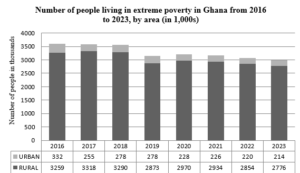Data from the Ministry of Commerce show that at the end of 2022 China’s rural internet users exceeded 300 million, expanding significantly over the previous year – at this pace of growth, driven mainly by the Chinese government’s effort to foster rural revitalization via digitalization, the Asian giant could provide internet access to all of its 491 million rural population in the next few years. Since 2014 rural communities across China have experienced steady progression in internet penetration.
Over this period, increasing access to the internet has brought new opportunities – bolstering growth across various rural industries. For example, through electronic commerce (e-commerce), which has gained traction among rural residents in recent years – the buying and selling of goods and services primarily via the internet, enables rural residents including farmers, innovators and entrepreneurs to overcome geographical barriers and access new and larger markets.
In 2022 China’s online retail sales in rural communities reached 2.17 trillion yuan, up from 180 billion yuan in 2014 – creating new job opportunities – At the end of 2022 the total number of rural online businesses surpassed 17.3 million – over the last decade, the emerging internet industry has boosted productivity, spurred consumption and lifted the rural population out of extreme poverty – injecting new impetus into rural revitalization. A joint research released by the World Bank and Alibaba Group in 2019 finds a positive association between e-commerce and household welfare improvement in rural China. In Taobao Villages, households that participate in e-commerce have incomes 80 percent higher than households that do not participate. E-shop workers have wage levels equal to or higher than workers in urban private industries. Women and younger, better educated in rural households are stronger beneficiaries of e-commerce in China.
While there is still room for improvement, China’s success in fostering internet penetration to advance rural revitalization over the last decade, certainly presents essential lessons to developing countries around the globe – in the case of Ghana, drawing lessons from China to accelerate internet access in rural areas could bring enormous social, environmental and economic gains. Strengthening internet access in rural Ghana could significantly foster job creation, boost productivity and drive consumption – lifting the country’s rural population from extreme poverty. Poverty in Ghana is increasingly concentrated in rural areas – out of the country’s 2.99 million people living in extreme poverty (people living on US$1.90 a day) in 2023 rural areas account for about 2.8 million – a daunting challenge that could be solved with enhanced internet access.

Accelerated internet penetration in rural Ghana could reenergise various rural industries, including entrepreneurship and agriculture, the main source of employment in the country’s rural region. Data from the World Bank show that over the past decade, internet uptake in Ghana soared by almost 9-fold, the share of the population with online presence increased from 8 percent in 2010 to 69 percent in 2021. However, this data is misleading – urban-rural uptake gaps persists and are widening. In urban areas, internet uptake rates increased from 13 percent to 80 percent compared to 2 percent to 54 percent in rural areas.
To unlock the full potential of Ghana’s rural economy, it is essential to effectively address the widening disparity in internet penetration between urban and rural communities – bridging internet penetration gaps between urban and rural areas, will not only promote efficiency and drive growth in the various rural industries but also enhance the flow of agriculture and other commodities from rural-based producers to urban markers via e-commerce – this would bolster productivity, create new jobs, increase incomes and boost consumption in Ghana’s rural region.
For example in China, where rural internet access rose from 178 million in 2014 to 308 million in 2022 – the expansion has been central in creating an enabling environment for emerging internet-related industries, including e-commerce to thrive in rural areas. At present, with the help of a mobile phone connected to the internet, entrepreneurs, farmers, innovators and owners of small and medium-sized enterprises in rural communities in China have the world in their hands. E- commerce, supported primarily by the internet simplifies business processes, enabling rural residents to overcome geographical barriers, compete and penetrate new and larger markets – driving the flow of goods and services between rural and urban communities, a move that has boosted capital flows to rural areas.
In recent years, the trend has not only created new job opportunities for rural residents but also attracts migrant workers from urban areas. In November 2022 the Ministry of Agriculture and Rural Affairs announced that over the past decade, about 11.2 million people returned from urban areas to China’s rural communities to set up their own businesses, with each entity creating six to seven stable jobs on an average.
In fact, the wind of change, blowing through rural communities in China, attributed to steady internet expansion has introduced new industries, including smart farming, e-health, e-education, financial technology and e-commerce which collectively have reenergized various traditional rural businesses and industries. Since the introduction of China’s Internet Plus action plan in 2015, aimed at integrating the internet with traditional industries, including agriculture the initiative has had profound impact on the country’s rural economy. Application of internet technologies including mobile internet, big data, cloud computing and Internet of Things have significantly improved the efficiency of traditional rural industries, especially in the agricultural value chain. From production, processing, financing and marketing, integration of internet technologies have contributed enormously to transform, and upgrade rural industries.
For example, in southwest China’s Guizhou Province, home to the country’s first national big data comprehensive pilot zone, application of big data has reenergised rural industries, addressing daunting challenges in an area where mountainous and hilly areas account for 92.5 percent of the total land size. Serving as a backbone of the high-quality social and economic development in Guizhou Province, integration of internet technologies such as big data has boosted productivity and transformed various rural industries, including agriculture – In Xiuwen County, located in the Guizhou Province, which is a major producer of kiwi fruit in China, a total of 32 kiwi fruit orchards are connected to a local big data platform through the Internet of Things technology, covering more than 4,000 hectares – with this internet technology, farmers, with the help of a mobile phone are able to access real-time data of orchard conditions including temperature, soil moisture and humidity and subsequently choose the appropriate time for pollination, fertilization and pruning, ensuring effective orchard management. Compared to traditional agriculture which relies solely on farmers’ experience and weather conditions, the internet technology has significantly improved the quality and output of kiwi fruits in Xiuwen County – raising income of farmers.
Similarly, integration of internet technologies in rural Ghana, just as China has done in recent years, could transform and upgrade the entire value chain into modern modes across production, processing, marketing and financing in farming and non-farming rural industries – this transformation could unlock the full potential of Ghana’s rural economy – ensure efficiency, drive productivity, foster job creation and shared prosperity, alleviate poverty and boost capital flow into rural areas. For example, through financial technology, which includes online banking and mobile payments, widespread adoption of the digital technology in rural Ghana could further enhance financial inclusion, open opportunities for rural residents, mostly unbanked and underserved to access financial services such as insure against risk, cultivate the culture of saving part of their income and access credit from financial institutions – tackling lack of financing, a major challenge that impedes growth in rural businesses and industries. Considering the positive impact of internet penetration on rural development, it is imperative for Ghanaian policymakers, the development community and relevant stakeholders to advance information and communications technology (ICT) and related infrastructure developments to support widespread adoption of internet technologies across farming and non-farming rural industries.
About the Author
Alexander is a global economist with keen interest in the social, environmental and economic landscape of both developing and developed countries, particularly in Asia, Africa and Europe..










